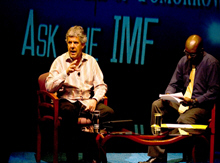
Typical street scene in Santa Ana, El Salvador. (Photo: iStock)
IMF Survey: Economic Future, Role of IMF Top Caribbean Students' Concerns
February 11, 2011
- IMF meets with Caribbean youth to discuss economy, policy options
- Students challenge role of IMF in the Caribbean
- Call for more efforts to protect the poor
The impact of the global crisis on the Caribbean region has been deeper than in other countries in the hemisphere. The region needs new sources of growth, and the IMF should clarify its role in the region and put greater emphasis on protecting the most vulnerable, said students from the region.

IMF’s Nicolás Eyzaguirre speaking to students at town hall meeting in Barbados (photo: Ammi-Maria Fitzpatricks/Marniko Media)
Youth Dialog
“The Caribbean region faces economic and social challenges that call for fresh ideas from the younger generation,” said Nicolás Eyzaguirre, Director of the IMF’s Western Hemisphere Department during a town hall-style dialogue with students from the Caribbean organized by the University of the West Indies and the Caribbean Media Corporation on January 27.
Even before the crisis, economic growth had lagged other regions because of weak productivity growth and limited integration with the new global “growth poles” like Brazil and China. Countries in the Caribbean, saddled with high debt levels, need to reduce public debt and develop new sources of growth to enhance their prospects.
“The IMF wants to support countries in the region in their own efforts to raise and improve the quality of growth, but you―the younger generation―need to create the future for yourselves,” Eyzaguirre added.
Reaching out to future leaders
The televised town hall event was held at UWI’s Cave Hill Campus in Bridgetown, Barbados. With campuses throughout the region, the UWI brings together students from across the Caribbean and provides a good example of regional integration and cooperation that can promote economies of scale and networking to benefit individuals and the Caribbean as a whole.
The town hall meeting followed an outreach campaign—“Caribbean Leaders of Tomorrow: Ask the IMF”—that invited students from the region to submit questions to the UWI on any economic issue of importance to them and also on the role of the IMF. The UWI received many excellent and probing questions from students representing 12 countries around the region. Live questions were also taken from the floor.
“This is why we have come here, to listen to your views and concerns, to exchange ideas about the best policy options for the Caribbean, and to explain more clearly what the IMF does, and what it aims to do,” said Eyzaguirre, as he welcomed more than 60 students to the town hall.
The IMF’s role in the region
Asked about the mission of the IMF, Eyzaguirre replied that the Fund is best known for providing financial resources and technical support when countries are hit by external shocks such as natural disasters, something this region knows well, and, more recently, from the fallout from the global economic and financial crisis.
Eyzaguirre described the Fund as a credit union for countries: 187 member countries deposit capital in the Fund, which gives them ownership and voice in the management of the organization―in proportion to their capital share. “Decisions at the IMF are made by the membership as a whole, including your governments, and this includes how programs are designed and what conditions are placed on borrowers,” explained Eyzaguirre.
Students challenged the Director with pointed questions, such as asking him to describe the IMF’s role in what they called “failed” structural adjustment programs of the past.
Eyzaguirre acknowledged that the IMF had made mistakes in the past, particularly by over-extending its loan conditions into areas beyond those necessary to fix the underlying cause of the problem. This had weakened the overall success of Fund-supported programs.
In recent years, the Fund has made a deliberate effort to learn from that experience. “Fund-supported program conditions are now more streamlined and are more tailored to suit each country’s specific circumstances,” said Eyzaguirre. More importantly, the IMF now ensures that social spending to protect the most vulnerable members of society is protected, or increased.
Knowledge is key
In response to a question about the knowledge economy, Eyzaguirre stressed that the Caribbean needs to produce more with the same resources. “This region has relied on the traditional approach of raising investment―factor accumulation―to increase growth, rather than producing more with existing factors, that is, raising productivity. The difference in these approaches is indeed the knowledge economy. The Caribbean region has a lot of room to better develop this area, which could lead to new sources of growth, such as offshore services in the areas of health, education, and finance.”
When asked about the “Washington Consensus” and its prescription of unending cuts in public spending, Eyzaguirre indicated that this was a myth, noting that cuts in health and education were the opposite of what was needed to boost the knowledge economy and productivity. “Cutting spending may be necessary for a country to live within its means, and to lower deficits and debt―a fact of life for this region―but it should be done in a way that makes room for more productive spending, and that protects the most vulnerable in society.”
Good advice for students
“Any economic adjustment or policy change must be done with the consent of the people to ensure social cohesion and success,” noted Eyzaguirre. To make sure the IMF is well-informed and equipped to provide the best support possible to member countries, it is engaging much more with external partners, civil society, labor unions, parliamentarians, and students. “The IMF needs to understand the real and the political constraints in each country,” he said.
“As the future leaders of the Caribbean, your role is to go on doing what you are doing― pushing for the truth and getting the answers you need―and assume the leadership in your countries, because the future is in your hands,” Eyzaguirre added.


